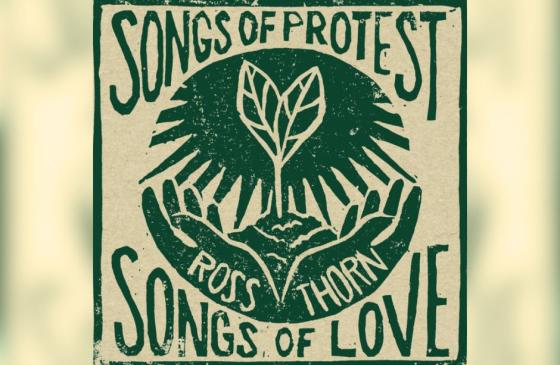Minnesota singer-songwriter Ross Thorn has released Songs of Protest, Songs of Love, a new EP with all proceeds benefiting Save the Boundary Waters. The collection is both a call to action and a celebration of what’s possible when we come together to protect our public lands.
Listen now at rossthorn.bandcamp.com or the music player below.
Behind the song “Meet Me In St. Louis”
Embracing Inspiration in Unexpected Places
In the current state of the world, inspiration is precious. It is the catalyst for change and the foundation of a better world. With a torrent of government threats to human rights and the natural world dominating every headline, however, the simple joy of feeling hope and purpose becomes elusive. Even when we do find a spark of optimism, it’s easy to doubt it or squash it with a good old-fashioned, social media doomscroll.
As a folk musician, it’s important to me to find a balance between calling out what is bad while trying to inspire others (and myself) with the hope of a better future. That balance is especially hard in the digital age where the weight of despair drags down any inspiration of my own.
How can I possibly fill anyone else’s cup if my own cup is dry?
Where can I find a well deep enough to refresh my optimism to share with others?
Weirdly enough, the answer for me was Broad City. The comedy series created by and starring Abbi Jacobson and Ilana Glazer aired its last episode in 2019, but it wasn’t until earlier this year that I watched every episode. It is a masterpiece from start to finish and I couldn’t recommend it enough. So how does this inspire a song about the Boundary Waters?! Let me explain:
(Very mild spoiler ahead)
In the finale of the show, Abbi is moving to Colorado away from her best friend, Ilana. Heartbroken by the idea that they wouldn’t be together if the apocalypse happens, they make plans to meet halfway between their homes, which is St. Louis, Missouri.
I really liked the phrase: “Meet Me In St. Louis.” It somehow felt right for a dystopian future and I didn’t know why.
I began tossing it around with a melody, picking a line on the banjo and watching it evolve over dozens of voice memos. For the lyrics, I kept coming back to the idea of ”if everything collapses” scenarios and falling on the title phrase.
The song and its purpose began to truly take form when I attended an event about using fiction and imagination as tools for organizing. The workshop was led by my friend Claire B. and encouraged participants to envision a future where a need was met. It reminded me of a book called The Atlas of Disappearing Places by Christina Conklin and Marina Psaros, where they speculate both good and bad scenarios in the near future and how they might come to be.
In the face of constant doom and gloom in traditional and social media, I found it refreshing to think of the good things that we can still accomplish. I was inspired to walk back a good scenario and outline actions I could take that might help us get there.
The finished song “Meet Me In St. Louis” turns what was first an idea to flee societal collapse and meet a loved one in Missouri into a call to action to stand strong where our roots are in St. Louis County. The lyrics imagine our world in the coming decades, highlighting the struggles we may realistically face when attempting to defend the wilderness we cherish.
But if we can bravely envision a future where the Boundary Waters are thriving in fifty years, what do we need to do in twenty years, ten years, and tomorrow to make that future possible? What is within our power to make a small step towards that world?
Here’s a couple ideas off the top of my head:
- Go on trips to the BWCA.
- Have conversations with friends and family about how important it is to protect natural lands.
- Shop at businesses that support BWCA preservation.
- Donate monthly to organizations like Save the Boundary Waters.
- Call your representatives to express your concern for the BWCA and ask for policies that protect it.
Make and share art that celebrates natural lands.
Individually, we have the power to contribute to the cause in some way. Collectively, we have the power to make real change happen. Keep doing as much as you can right now to help prevent bigger battles in the future. And if it all goes south, I hope you’ll meet me in St. Louis (County).
